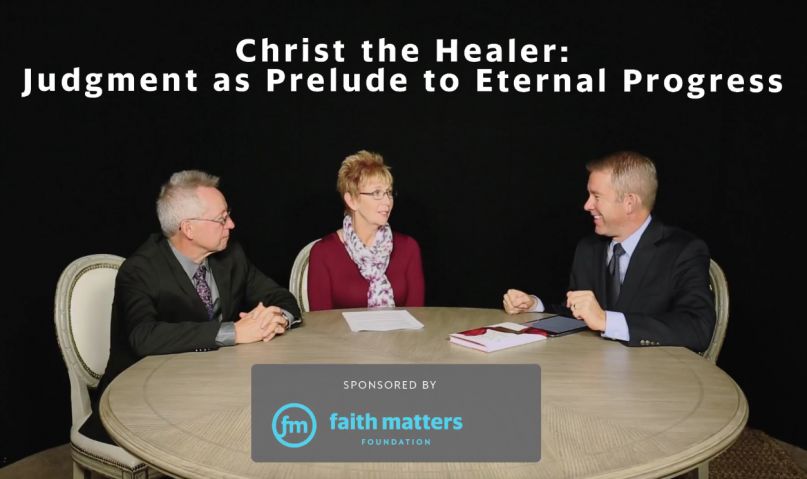It’s always a privilege to read and hear Terryl and Fiona Givens — and now, we can see them on TV, thanks to a new podcast from the Faith Matters Foundation.* Click below for both parts of it, each about half an hour.
In this two-part interview with BYU professor Spencer Fluhman (who is also the executive director of the Maxwell Institute), the authors discuss some of the topics in their latest book with Deseret, The Christ Who Heals. Longtime blog readers may remember a few years ago when we did a group read-through of the Givenses’ book The Crucible of Doubt; see here for the first in that series.) I’m a big fan of theirs.
 At core in this book is the question of how Christ saves. Terryl and Fiona explain in the interview (especially at the beginning of Part 2, below) that they were inspired in learning that the same Greek word that’s translated in English scriptures as “to save” also means “to heal.” How does that change our ideas of judgment, atonement, and salvation?
At core in this book is the question of how Christ saves. Terryl and Fiona explain in the interview (especially at the beginning of Part 2, below) that they were inspired in learning that the same Greek word that’s translated in English scriptures as “to save” also means “to heal.” How does that change our ideas of judgment, atonement, and salvation?
I look forward to reading the book — it’s on my list for that shangri-la time after my own book is written — but in the meantime I enjoyed the great conversation they have with Spencer about it. God, they say, is neither the exacting punisher some have imagined nor the anything-goes giving tree who asks nothing of us. There’s a middle ground for Mormon theology, in which we actually believe what we say about eternal progress. “If you feel the fear” at the word “judgement,” says Fiona in my favorite part, “that is not God speaking.”
If you want to go further, here are some questions for discussion and reflection provided by the Faith Matters Foundation:
- Historically, where did we get the idea of a God who sits in judgement ready to mete out justice to sinners if not for Christ’s mediation?
- Are there clear echoes in very early Christianity of distinctly Mormon theology?
- How is Christ’s “judgment” not about condemnation but rather a necessary and helpful “prelude to progress?”
- We talk about Christ saving us from our sins, but would we profit from a greater focus on his role as healer of our souls and healer of a fractured humanity?
- Is it true that we will some day be consigned eternally to whatever realm we’ve merited in this life? Or will our heavenly parents always leave the door open to their children to grow eternally and live with them?
* FYI, I’m a proud member of the Faith Matters Foundation board of advisers, as are both Terryl and Fiona.
Watch Part 1 here
Watch Part 2 here






